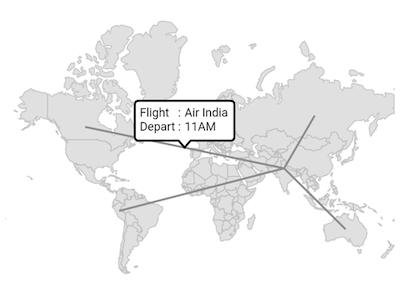How can I help you?
Lines in Flutter Maps (SfMaps)
28 Jul 202524 minutes to read
Line layer is a sublayer that renders a group of MapLine on MapShapeLayer and MapTileLayer. This section helps you learn how to add lines and customize them.
Adding lines
The lines is a collection of MapLine. Every single MapLine connects two location coordinates through a straight line. The start coordinate is set to MapLine.from property and the end coordinate is set to MapLine.to property.
NOTE
It is applicable for both the tile layer and shape layer.
In the shape layer
late MapShapeSource dataSource;
late List<DataModel> data;
@override
void initState() {
data = <DataModel>[
DataModel(MapLatLng(28.7041, 77.1025), MapLatLng(56.1304, -106.3468)),
DataModel(MapLatLng(28.7041, 77.1025), MapLatLng(-9.1900, -75.0152)),
DataModel(MapLatLng(28.7041, 77.1025), MapLatLng(61.5240, 105.3188)),
DataModel(MapLatLng(28.7041, 77.1025), MapLatLng(-25.2744, 133.7751)),
];
dataSource = MapShapeSource.asset(
'assets/world_map.json',
shapeDataField: 'continent',
);
super.initState();
}
@override
Widget build(BuildContext context) {
return Scaffold(
body: Padding(
padding: EdgeInsets.all(10),
child: SfMaps(layers: [
MapShapeLayer(
source: dataSource,
sublayers: [
MapLineLayer(
lines: List<MapLine>.generate(data.length, (int index) {
return MapLine(
from: data[index].from,
to: data[index].to,
);
}).toSet(),
),
],
),
]),
),
);
}
class DataModel {
DataModel(this.from, this.to);
final MapLatLng from;
final MapLatLng to;
}In the tile layer
late List<DataModel> data;
@override
void initState() {
data = <DataModel>[
DataModel(MapLatLng(28.7041, 77.1025), MapLatLng(56.1304, -106.3468)),
DataModel(MapLatLng(28.7041, 77.1025), MapLatLng(-9.1900, -75.0152)),
DataModel(MapLatLng(28.7041, 77.1025), MapLatLng(61.5240, 105.3188)),
DataModel(MapLatLng(28.7041, 77.1025), MapLatLng(-25.2744, 133.7751)),
];
super.initState();
}
@override
Widget build(BuildContext context) {
return Scaffold(
body: Padding(
padding: EdgeInsets.all(10),
child: SfMaps(layers: [
MapTileLayer(
urlTemplate: 'https://tile.openstreetmap.org/{z}/{x}/{y}.png',
sublayers: [
MapLineLayer(
lines: List<MapLine>.generate(data.length, (int index) {
return MapLine(
from: data[index].from,
to: data[index].to,
);
}).toSet(),
),
],
),
]),
),
);
}
class DataModel {
DataModel(this.from, this.to);
final MapLatLng from;
final MapLatLng to;
}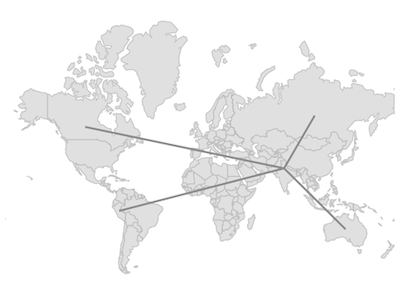
Color
You can apply the same color for all MapLine in the lines collection using the MapLineLayer.color property. Alternatively, you can apply different colors to each MapLine in the lines collection using the individual MapLine.color property.
late MapShapeSource dataSource;
late List<DataModel> data;
@override
void initState() {
data = <DataModel>[
DataModel(MapLatLng(28.7041, 77.1025), MapLatLng(56.1304, -106.3468), Colors.redAccent),
DataModel(MapLatLng(28.7041, 77.1025), MapLatLng(-9.1900, -75.0152), Colors.deepPurpleAccent),
DataModel(MapLatLng(28.7041, 77.1025), MapLatLng(61.5240, 105.3188), Colors.blueAccent),
DataModel(MapLatLng(28.7041, 77.1025), MapLatLng(-25.2744, 133.7751), Colors.teal),
];
dataSource = MapShapeSource.asset(
'assets/world_map.json',
shapeDataField: 'continent',
);
super.initState();
}
@override
Widget build(BuildContext context) {
return Scaffold(
body: Padding(
padding: EdgeInsets.all(10),
child: SfMaps(layers: [
MapShapeLayer(
source: dataSource,
sublayers: [
MapLineLayer(
lines: List<MapLine>.generate(data.length, (int index) {
return MapLine(
from: data[index].from,
to: data[index].to,
color: data[index].color,
);
}).toSet(),
),
],
),
]),
),
);
}
class DataModel {
DataModel(this.from, this.to, this.color);
final MapLatLng from;
final MapLatLng to;
final Color color;
}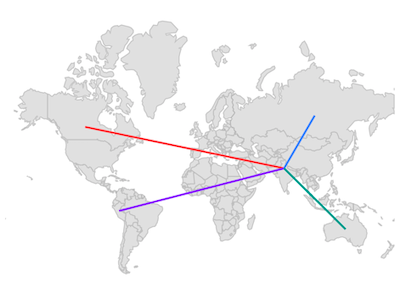
Width
You can apply the same width for all MapLine in the lines collection using the MapLineLayer.width property. Alternatively, you can apply different width to each MapLine in the lines collection using the individual MapLine.width property. The default value of the MapLineLayer.width property is 2.
late MapShapeSource dataSource;
late List<DataModel> data;
@override
void initState() {
data = <DataModel>[
DataModel(MapLatLng(28.7041, 77.1025), MapLatLng(56.1304, -106.3468), 2),
DataModel(MapLatLng(28.7041, 77.1025), MapLatLng(-9.1900, -75.0152), 4),
DataModel(MapLatLng(28.7041, 77.1025), MapLatLng(61.5240, 105.3188), 5),
DataModel(MapLatLng(28.7041, 77.1025), MapLatLng(-25.2744, 133.7751), 6),
];
dataSource = MapShapeSource.asset(
'assets/world_map.json',
shapeDataField: 'continent',
);
super.initState();
}
@override
Widget build(BuildContext context) {
return Scaffold(
body: Padding(
padding: EdgeInsets.all(10),
child: SfMaps(layers: [
MapShapeLayer(
source: dataSource,
sublayers: [
MapLineLayer(
lines: List<MapLine>.generate(data.length, (int index) {
return MapLine(
from: data[index].from,
to: data[index].to,
width: data[index].width,
);
}).toSet(),
),
],
),
]),
),
);
}
class DataModel {
DataModel(this.from, this.to, this.width);
final MapLatLng from;
final MapLatLng to;
final double width;
}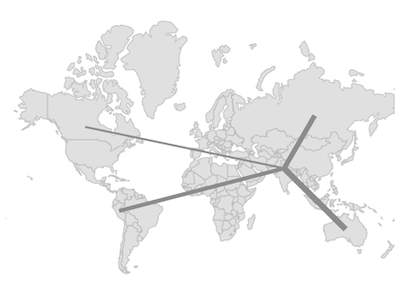
Stroke cap
You can apply the same stroke cap for all MapLine in the lines collection using the MapLineLayer.strokeCap property. Alternatively, you can apply different stroke cap to each MapLine in the lines collection using the individual MapLine.strokeCap property. The default value of the MapLineLayer.strokeCap property is StrokeCap.butt. The available values are butt, round, and square.
late MapShapeSource dataSource;
late List<DataModel> data;
@override
void initState() {
data = <DataModel>[
DataModel(MapLatLng(28.7041, 77.1025), MapLatLng(56.1304, -106.3468), 3),
DataModel(MapLatLng(28.7041, 77.1025), MapLatLng(-9.1900, -75.0152), 4),
DataModel(MapLatLng(28.7041, 77.1025), MapLatLng(61.5240, 105.3188), 6),
DataModel(MapLatLng(28.7041, 77.1025), MapLatLng(-25.2744, 133.7751), 7),
];
dataSource = MapShapeSource.asset(
'assets/world_map.json',
shapeDataField: 'continent',
);
super.initState();
}
@override
Widget build(BuildContext context) {
return Scaffold(
body: SfMaps(
layers: [
MapShapeLayer(
source: dataSource,
sublayers: [
MapLineLayer(
lines: List<MapLine>.generate(data.length, (int index) {
return MapLine(
from: data[index].from,
to: data[index].to,
width: data[index].width,
strokeCap: StrokeCap.round,
);
}).toSet(),
),
],
),
],
),
);
}
class DataModel {
DataModel(this.from, this.to, this.width);
final MapLatLng from;
final MapLatLng to;
final double width;
}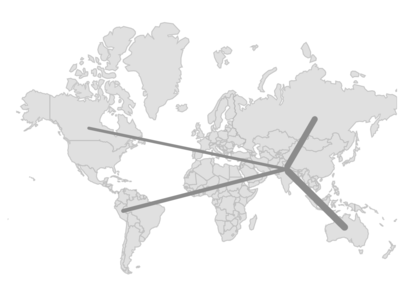
Dash array
You can apply dash support for the line using the MapLine.dashArray property.
A sequence of dash and gap will be rendered based on the values in this list. Once all values of the list are rendered, it will be repeated again till the end of the line.
late MapShapeSource dataSource;
late List<DataModel> data;
@override
void initState() {
data = <DataModel>[
DataModel(MapLatLng(28.7041, 77.1025), MapLatLng(56.1304, -106.3468)),
DataModel(MapLatLng(28.7041, 77.1025), MapLatLng(-9.1900, -75.0152)),
DataModel(MapLatLng(28.7041, 77.1025), MapLatLng(61.5240, 105.3188)),
DataModel(MapLatLng(28.7041, 77.1025), MapLatLng(-25.2744, 133.7751)),
];
dataSource = MapShapeSource.asset(
'assets/world_map.json',
shapeDataField: 'continent',
);
super.initState();
}
@override
Widget build(BuildContext context) {
return Scaffold(
body: Padding(
padding: EdgeInsets.all(10),
child: SfMaps(layers: [
MapShapeLayer(
source: dataSource,
sublayers: [
MapLineLayer(
lines: List<MapLine>.generate(data.length, (int index) {
return MapLine(
from: data[index].from,
to: data[index].to,
dashArray: [8, 4, 2, 4],
);
}).toSet(),
color: Colors.blue,
),
],
),
]),
),
);
}
class DataModel {
DataModel(this.from, this.to);
final MapLatLng from;
final MapLatLng to;
}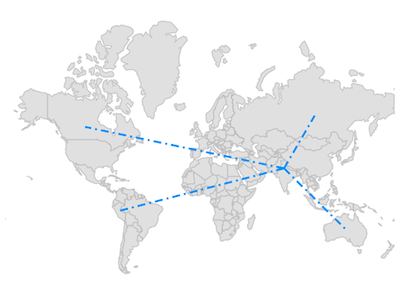
Animation
You can apply animation for the MapLine using the MapLineLayer.animation property and able to customize the animation flow, curve and duration.
By default, there will not be any animation.
late MapShapeSource dataSource;
late List<DataModel> data;
late AnimationController animationController;
late Animation animation;
@override
void initState() {
data = <DataModel>[
DataModel(MapLatLng(28.7041, 77.1025), MapLatLng(56.1304, -106.3468)),
DataModel(MapLatLng(28.7041, 77.1025), MapLatLng(-9.1900, -75.0152)),
DataModel(MapLatLng(28.7041, 77.1025), MapLatLng(61.5240, 105.3188)),
DataModel(MapLatLng(28.7041, 77.1025), MapLatLng(-25.2744, 133.7751)),
];
dataSource = MapShapeSource.asset(
'assets/world_map.json',
shapeDataField: 'continent',
);
animationController = AnimationController(
duration: Duration(seconds: 3),
vsync: this,
);
animation = CurvedAnimation(
parent: animationController,
curve: Curves.easeInOut,
);
animationController.forward(from: 0);
super.initState();
}
@override
void dispose() {
animationController?.dispose();
super.dispose();
}
@override
Widget build(BuildContext context) {
return Scaffold(
body: Padding(
padding: EdgeInsets.all(10),
child: SfMaps(layers: [
MapShapeLayer(
source: dataSource,
sublayers: [
MapLineLayer(
lines: List<MapLine>.generate(data.length, (int index) {
return MapLine(
from: data[index].from,
to: data[index].to,
);
}).toSet(),
color: Colors.blue,
animation: animation,
),
],
),
]),
),
);
}
class DataModel {
DataModel(this.from, this.to);
final MapLatLng from;
final MapLatLng to;
}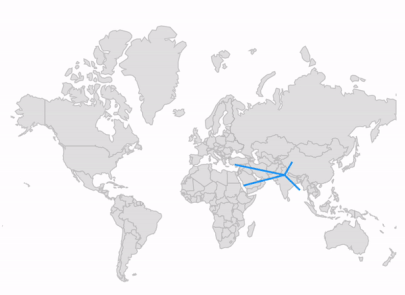
Tap
You can use the onTap callback to get a notification if the particular MapLine is tapped. You can also customize the tapped MapLine based on the index passed in the callback as shown in the below code snippet.
late MapShapeSource dataSource;
late List<DataModel> data;
late int selectedIndex;
@override
void initState() {
data = <DataModel>[
DataModel(MapLatLng(28.7041, 77.1025), MapLatLng(56.1304, -106.3468)),
DataModel(MapLatLng(28.7041, 77.1025), MapLatLng(-9.1900, -75.0152)),
DataModel(MapLatLng(28.7041, 77.1025), MapLatLng(61.5240, 105.3188)),
DataModel(MapLatLng(28.7041, 77.1025), MapLatLng(-25.2744, 133.7751)),
];
dataSource = MapShapeSource.asset(
'assets/world_map.json',
shapeDataField: 'continent',
);
selectedIndex = -1;
super.initState();
}
@override
Widget build(BuildContext context) {
return Scaffold(
body: Padding(
padding: EdgeInsets.all(10),
child: SfMaps(layers: [
MapShapeLayer(
source: dataSource,
sublayers: [
MapLineLayer(
lines: List<MapLine>.generate(data.length, (int index) {
return MapLine(
from: data[index].from,
to: data[index].to,
color: selectedIndex == index ? Colors.pink : Colors.blue,
onTap: () {
setState(() {
selectedIndex = index;
});
});
}).toSet(),
),
],
),
]),
),
);
}
class DataModel {
DataModel(this.from, this.to);
final MapLatLng from;
final MapLatLng to;
}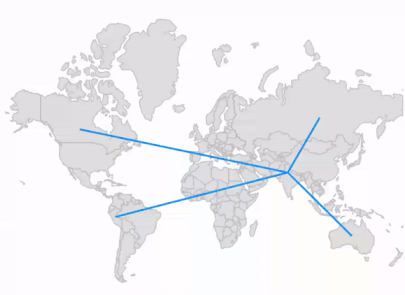
Tooltip
You can show additional information about the line drawn using the tooltipBuilder property.
late MapShapeSource dataSource;
late List<DataModel> data;
late Random random;
@override
void initState() {
data = <DataModel>[
DataModel(MapLatLng(28.7041, 77.1025), MapLatLng(56.1304, -106.3468)),
DataModel(MapLatLng(28.7041, 77.1025), MapLatLng(-9.1900, -75.0152)),
DataModel(MapLatLng(28.7041, 77.1025), MapLatLng(61.5240, 105.3188)),
DataModel(MapLatLng(28.7041, 77.1025), MapLatLng(-25.2744, 133.7751)),
];
dataSource = MapShapeSource.asset(
'assets/world_map.json',
shapeDataField: 'continent',
);
random = Random();
super.initState();
}
@override
Widget build(BuildContext context) {
final ThemeData themeData = Theme.of(context);
final TextStyle textStyle = themeData.textTheme.caption!
.copyWith(color: themeData.colorScheme.surface);
return Scaffold(
body: Padding(
padding: EdgeInsets.all(10),
child: SfMaps(layers: [
MapShapeLayer(
source: dataSource,
sublayers: [
MapLineLayer(
lines: List<MapLine>.generate(data.length, (int index) {
return MapLine(
from: data[index].from,
to: data[index].to,
);
}).toSet(),
tooltipBuilder: (BuildContext context, int index) {
return Container(
padding: EdgeInsets.only(left: 5, top: 5),
height: 40,
width: 100,
child: Column(
children: [
Row(
children: [
Text('Flight : ', style: textStyle),
Text('Air India', style: textStyle),
],
),
Row(
children: [
Text('Depart : ', style: textStyle),
Text(random.nextInt(12).toString() + 'AM', style: textStyle),
],
),
],
),
);
},
),
],
),
]),
),
);
}
class DataModel {
DataModel(this.from, this.to);
final MapLatLng from;
final MapLatLng to;
}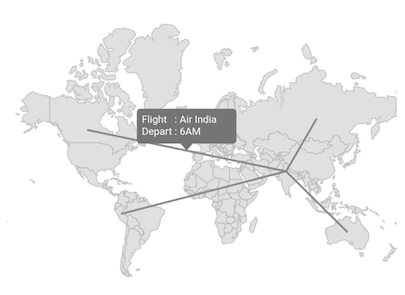
Tooltip customization
You can customize the appearance of the tooltip:
- Background color - Change the background color of the tooltip in the maps using the
MapTooltipSettings.colorproperty. - Stroke color - Change the stroke color of the tooltip in the maps using the
MapTooltipSettings.strokeColorproperty. - Stroke width - Change the stroke width of the tooltip in the maps using the
MapTooltipSettings.strokeWidthproperty.
late MapShapeSource dataSource;
late List<DataModel> data;
late Random random;
@override
void initState() {
data = <DataModel>[
DataModel(MapLatLng(28.7041, 77.1025), MapLatLng(56.1304, -106.3468)),
DataModel(MapLatLng(28.7041, 77.1025), MapLatLng(-9.1900, -75.0152)),
DataModel(MapLatLng(28.7041, 77.1025), MapLatLng(61.5240, 105.3188)),
DataModel(MapLatLng(28.7041, 77.1025), MapLatLng(-25.2744, 133.7751)),
];
dataSource = MapShapeSource.asset(
'assets/world_map.json',
shapeDataField: 'continent',
);
random = Random();
super.initState();
}
@override
Widget build(BuildContext context) {
return Scaffold(
body: Padding(
padding: EdgeInsets.all(10),
child: SfMaps(layers: [
MapShapeLayer(
source: dataSource,
tooltipSettings: const MapTooltipSettings(
color: Colors.white,
strokeWidth: 2,
strokeColor: Colors.black,
),
sublayers: [
MapLineLayer(
lines: List<MapLine>.generate(data.length, (int index) {
return MapLine(
from: data[index].from,
to: data[index].to,
);
}).toSet(),
tooltipBuilder: (BuildContext context, int index) {
return Container(
padding: EdgeInsets.only(left: 5, top: 5),
height: 40,
width: 100,
child: Column(
children: [
Row(
children: [
Text('Flight : '),
Text('Air India'),
],
),
Row(
children: [
Text('Depart : '),
Text(random.nextInt(12).toString() + 'AM'),
],
),
],
),
);
},
),
],
),
]),
),
);
}
class DataModel {
DataModel(this.from, this.to);
final MapLatLng from;
final MapLatLng to;
}